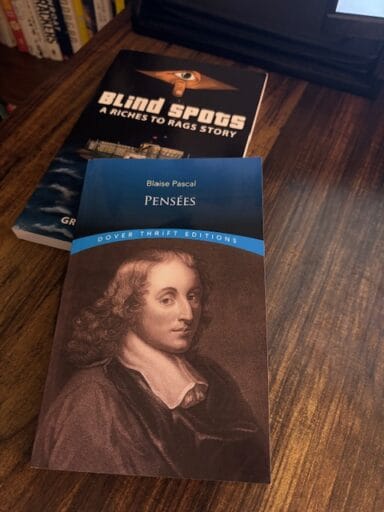Highlights from Pascal’s Pensées – On Diversion, Self-Love, and the Human Condition
By Gregory Blotnick
“We are so presumptuous that we would wish to be known by all the world, even by people who shall come after, when we shall be no more; and we are so vain that the esteem of five or six neighbours delights and contents us.” — Blaise Pascal, Pensées
Blaise Pascal’s Pensées remains one of the most profound examinations of human nature, psychology, and spirituality ever written. Actually, I don’t know how widely my opinion is shared here, so let me take a little gas off that. I would put it in the top five books that I’ve read over the last 38 years that single-handedly adjusted the way I view the entire world.
However, the truth is that circumstance plays a large role in a book affecting you like that – at age 20, 25, 30, or even 35 I’m not sure it would’ve registered, and it just so happened that I was already wandering down a rabbit hole of theology and philosophy when Pascal entered my orbit. Sometimes our minds just aren’t fertile, sometimes we aren’t ready to receive God’s message, and he will make you wait another season while he’s perfecting your character. Anyway, out of nothing but the highest respect for Pascal, I make sure that his literature is stored separately with the others of his ilk: Homer, Dante, Tolstoy, and so forth:

Now, the following are extended excerpts from Section II, The Misery of Man Without God, which includes Pascal’s most famous insight: that all of humanity’s problems stem from our inability to sit quietly in a room alone. Some of the following thoughts may seem disjointed, but that is just the way the man felt like writing at the time, and the title Pensées literally translates to English as thoughts. Section III is the infamous Wager, but before the Wager can be proposed, a broadside of epic proportions must first be made on the folly, deceit and vanity of man.
On Human Error and Self-Deception
“Man is only a subject full of error, natural and ineffaceable, without grace. Nothing shows him the truth. Everything deceives him…”
Pascal examines how reason, the senses, and self-love deceive one another, and how the human ego creates a cycle of illusion, insecurity, and denial.
“He wants to be great, and he sees himself small… He would annihilate [truth], but, unable to destroy it in its essence, he destroys it… in his own knowledge and in that of others.”
This deeply psychological passage explores humanity’s aversion to truth and our tendency to reject any feedback that threatens our self-image.
On Vanity, Glory, and Self-Love
“We do not like others to deceive us… it is not then fair that we should deceive them, and should wish them to esteem us more highly than we deserve.”
“Human life is thus only a perpetual illusion; men deceive and flatter each other… Man is then only disguise, falsehood, and hypocrisy…”
Pascal’s reflections on vanity feel startlingly modern, echoing today’s performative culture and obsession with reputation.
“Even philosophers wish for admirers… Those who write against vanity want the glory of having written well.”
Pascal’s Famous Quote on Diversion
“I have discovered that all the unhappiness of men arises from one single fact, that they cannot stay quietly in their own chamber.”
This line is the most well-known from Pensées, often cited in psychology, philosophy, and productivity circles. Pascal argues that our inability to face solitude causes us to seek endless distraction.
“Hence it comes that men so much love noise and stir… the prison is so horrible a punishment… the pleasure of solitude is a thing incomprehensible.”
The Need for Constant Distraction
“The king is surrounded by persons whose only thought is to divert the king, and to prevent his thinking of self. For he is unhappy, king though he be, if he think of himself.”
Pascal illustrates that even the most powerful people are miserable without diversion; kings, nobles, and commoners alike.
“What more could be done to make them miserable? We should only have to relieve them from all these cares; for then they would see themselves.”
“Thus passes away all man’s life. Men seek rest in a struggle against difficulties; and when they have conquered these, rest becomes insufferable.”
The Futility of Fame, Play, and Pursuit
“Men spend their time in following a ball or a hare; it is the pleasure even of kings.”
Pascal humorously critiques how easily we trade deep thought for shallow games and distractions.
“Give him each morning the money he can win each day, on condition he does not play; you make him miserable.”
Whether it’s war, gambling, politics, or work, what we’re really chasing is the thrill of pursuit, not the prize itself.
The Present Is Never Enough
“We do not rest satisfied with the present… So we never live, but we hope to live; and, as we are always preparing to be happy, it is inevitable we should never be so.”
This observation about the nature of time, anticipation, and dissatisfaction echoes Stoic and Buddhist thought… but with Pascal’s own metaphysical twist.
Death, Weariness, and the Pursuit of Diversion
“As men are not able to fight against death, misery, ignorance, they have taken it into their heads… not to think of them at all.”
“The only thing which consoles us for our miseries is diversion, and yet this is the greatest of our miseries.”
Pascal’s paradox: the very thing that keeps us going, our distractions, is also what prevents us from living meaningfully.
Final Reflection
“This man, born to know the universe, to judge all causes, to govern a whole state, is altogether occupied and taken up with the business of catching a hare.”
Incredible.
As you were,
GB
